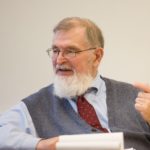How do we arrive at the idea of God, at the awareness of his existence? The course ponders this question in terms of such issues as whether knowledge of God is immediate (innate, “a priori”) or inferential (“a posteriori”); whether affirmation of God’s existence is a function primarily of some (non-cognitive) human need (e.g., for security); whether the act by which we reach God is a matter of freedom or intelligence (or affectivity), of supernatural faith or man’s natural capacities. The course considers the sense in which the idea of God operates in every act of human consciousness, and in which the memory of God is necessary for the integrity of human experience (human thinking, acting, and being). Readings for the course will be drawn from among the following: Plato, Aristotle, Augustine, Aquinas, Hume, Locke, Kant, de Lubac, von Balthasar, Ratzinger, and Polanyi.
Selected Texts
Augustine, Confessions, Book X.
David C. Schindler, The Catholicity of Reason.
Henri de Lubac, The Discovery of God.
Faculty

David L. Schindler
Edouard Cardinal Gagnon Professor of Fundamental Theology
Dean Emeritus
Since 1982, Dr. Schindler has been editor-in-chief of the North American edition of Communio: International Catholic Review. He has published articles in the areas of metaphysics, philosophical issues in bioscience and technology, gender, and the relation between theology/philosophy and American culture. Professor Schindler was appointed by Pope John Paul II as a consultor to the Pontifical Council for the Laity from 2002 to 2007.
Learn More